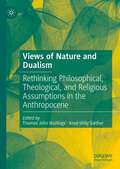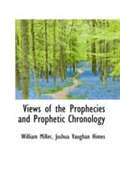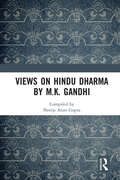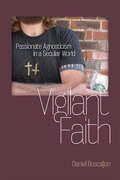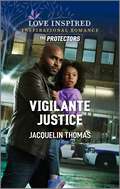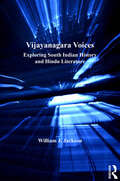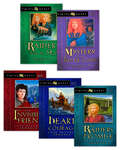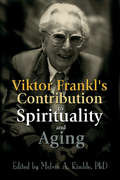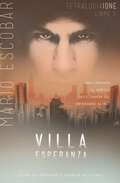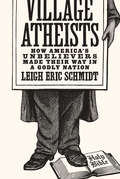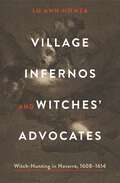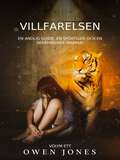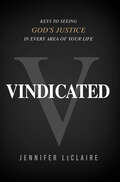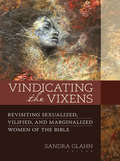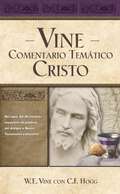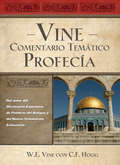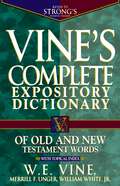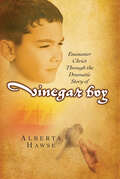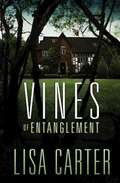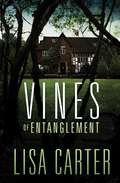- Table View
- List View
Views of Nature and Dualism: Rethinking Philosophical, Theological, and Religious Assumptions in the Anthropocene
by Knut-Willy Sæther Thomas John HastingsIn the face of the anthropogenic threats to the singular planetary habitat we share with other human beings and non-human species, humanities scholars feel a renewed sense of urgency 1) to acknowledge the ways our species has funded particular histories of environmental exploitation, alienation, and collapse, 2) to unpack inherited assumptions that impact our views of nature and interspecies relations, and 3) to suggest ways of thinking and acting that seek to repair the damage and promote mutual flourishing for all of earth inhabitants. This volume brings together scholars in philosophy, theology, and religion who take up this urgent ethical task from a broad range of perspectives and locations.
Views of the Prophecies and Prophetic Chronology
by Joshua V. Himes William MillerRather than a book written as such, this work is a collection of lectures and letters written by Mr. Miller, and put into book form by Mr. Himes. Spelling as in original.
Views on Hindu Dharma by M.K. Gandhi
by Neerja Arun GuptaMohandas Karamchand Gandhi took pride in calling himself a Sanatani Hindu. He lived by what he professed. Indeed, he spiritualized his entire political existence and his very opinion, world view and discourse was weighted with morality and ethics born of Hindu Dharma.This timely compilation of Mahatma Gandhi’s views on Hindu Dharma is a remarkable and systematically arranged compendium of his ideas on every aspect of India’s social and political life.Gandhi’s views – disseminated through many short essays in Harijan and other journals of his time – on Sanatan Dharma, idol worship, Rama as a God, compulsory teaching of Gita in schools, conversion, cow-slaughter and protection, varnashramas, untouchability and other aspects are presented here in his own words.This volume is indispensable for scholars of Modern South Asian History, Gandhian Thought, Colonialism and Religious Studies. Please note: Taylor & Francis does not sell or distribute the Hardback in India, Pakistan, Nepal, Bhutan, Bangladesh and Sri Lanka
Vigilant Faith: Passionate Agnosticism in a Secular World (Studies in Religion and Culture)
by Daniel BoscaljonIn Vigilant Faith: Passionate Agnosticism in a Secular World, Daniel Boscaljon takes up the contemporary challenges to faith by skepticism and secularism. He proposes a model of faith for believers and unbelievers alike—a passionate agnosticism—that is rooted in a skeptical consciousness. Skepticism and faith are structurally similar, he writes, in that they share an "unknowing" quality. The author argues that vigilance—the act of keeping watch, a spiritual practice in its own right—is as necessary a precondition for the structure of faith as it is for the structure of skepticism. A suspension in uncertainty and an openness to possibility require vigilance, he attests, if faith and skepticism are to avoid the often dogmatic tendencies of both theism and atheism to cling to their own brands of certainty and knowledge.Boscaljon has three aims: to expand the current, post-theistic definitions of God for greater relevance to human beings on an individual and existential level; to integrate skepticism into faith so that it will restore the importance of faith to current theology and recover it from anti-intellectual bias; and to conceptualize the vigilance of faith in such a way that can provide a vocabulary for distinguishing "good faith" from "bad faith." He offers a variety of cultural examples ranging from film to poetry to represent a life of faith and to show how its components come together in practice. As an alternative to the prevailing fundamentalisms in today's world, his book proposes a paradigmatic understanding of faith in which theism, atheism, and agnosticism refuse to differ.
Vigilante Justice
by Jacquelin ThomasWith a ruthless killer out for revengeShe&’ll do anything to protect her child…Everleigh Taylor has worked tirelessly to build a safe life for her young daughter. But someone is targeting them to avenge her serial killer father&’s crimes. As she and Detective Declan Blanchet plunge back into a terrifying past, Declan&’s unwavering protection gives Everleigh hope for the future. But a merciless adversary will force them into an endgame no one can win…
Vijayanagara Voices: Exploring South Indian History and Hindu Literature
by William J. JacksonThe Vijayanagara Empire flourished in South India between 1336 and 1565. Conveying the depth and creativity of Hindu religious and literary expression during that time, Vijayanagara Voices explores some of the contributions made by poets, singer-saints, and philosophers. Through translations and discussions of their lives and times, Jackson presents the voices of these cultural figures and reflects on the concerns of their era, looking especially into the vivid images in their works and their legends. He examines how these images convey both spiritual insights and physical experiences with memorable candour. The studies also raise intriguing questions about the empire's origins and its response to Muslim invaders, its 'Hinduness', and reasons for its ultimate decline. Vijayanagara Voices is a book about patterns in history, literature and life in South India. By examining the culture's archetypal displays, by understanding the culture in its own terms, and by comparing associated images and ideas from other cultures, this book offers unique insights into a rich and influential period in Indian history.
Viking Quest Series (Viking Quest Series #1)
by Lois Walfrid JohnsonThis set contains all five books of the Viking Quest Series: Raiders From the Sea, Mystery of the Silver Coins, The Invisible Friend, Heart of Courage, and The Raider's Promise.In Raiders From the Sea, Viking raiders capture Bree and her brother Devin and take them from their home in Ireland. After the young Viking prince Mikkel sets Devin free on the Irish coast far from home, Bree and Devin embark on separate journeys to courage. Readers will be captivated by the unfolding drama as Bree sails to Norway on the Viking ship and Devin travels the dangerous road home. They both must trust their all-powerful God in the midst of difficult situations. In Mystery of the Silver Coins, Bree finds herself in a physical and spiritual battle for survival. With another young slave, she makes a daring escape from the ship as soon as it reaches harbor. They hide in the woods as Mikkel and his Viking sailors begin a relentless search, certain that Bree is responsible for a missing bag of silver coins. Bree must face her unwillingless to forgive the Vikings, and Mikkel begins to wonder: Is the God of these Irish Christians really more powerful than our own Viking gods? In The Invisible Friend, Bree arrives in Norway and is sent to work as a slave for the family of Mikkel, her Viking captor. She struggles to adjust, feeling worthless and disrespected, and wondering why God wants her in Norway. Her prayers are answered when she is given the opportunity to teach Mikkel's grandparents to read using an illuminated Bible stolen from an Irish monastery. In the Heart of Courage, Bree learns that her brother, Devin, her sister, Keely, and her friend, Lil, will set out for Ireland. She longs to go with them. Instead, Mikkel asks her to be a cook for voyage to Greenland. Somehow her excellent food becomes inedible and the Vikings think she's trying to sabotage their voyage. Join Bree and Devin for more adventures in this fourth installment of the Viking Quest series.In The Raider's Promise, Bree, Devin, and Mikkel enter a new world with the explorer Leif Erikson. Their first task: build a shelter to survive the winter. But danger lurks from within the shadows on the horizon of a life where everyone needs the courage to win. Can Mikkel conquer his enemies and find new purpose for his life? Will he keep his promise to Bree and Devin to take them home to Ireland? Will he keep his pledge of honor, even if it means death?
Viking Quest Series (Viking Quest Series #1)
by Lois Walfrid JohnsonThis set contains all five books of the Viking Quest Series: Raiders From the Sea, Mystery of the Silver Coins, The Invisible Friend, Heart of Courage, and The Raider's Promise.In Raiders From the Sea, Viking raiders capture Bree and her brother Devin and take them from their home in Ireland. After the young Viking prince Mikkel sets Devin free on the Irish coast far from home, Bree and Devin embark on separate journeys to courage. Readers will be captivated by the unfolding drama as Bree sails to Norway on the Viking ship and Devin travels the dangerous road home. They both must trust their all-powerful God in the midst of difficult situations. In Mystery of the Silver Coins, Bree finds herself in a physical and spiritual battle for survival. With another young slave, she makes a daring escape from the ship as soon as it reaches harbor. They hide in the woods as Mikkel and his Viking sailors begin a relentless search, certain that Bree is responsible for a missing bag of silver coins. Bree must face her unwillingless to forgive the Vikings, and Mikkel begins to wonder: Is the God of these Irish Christians really more powerful than our own Viking gods? In The Invisible Friend, Bree arrives in Norway and is sent to work as a slave for the family of Mikkel, her Viking captor. She struggles to adjust, feeling worthless and disrespected, and wondering why God wants her in Norway. Her prayers are answered when she is given the opportunity to teach Mikkel's grandparents to read using an illuminated Bible stolen from an Irish monastery. In the Heart of Courage, Bree learns that her brother, Devin, her sister, Keely, and her friend, Lil, will set out for Ireland. She longs to go with them. Instead, Mikkel asks her to be a cook for voyage to Greenland. Somehow her excellent food becomes inedible and the Vikings think she's trying to sabotage their voyage. Join Bree and Devin for more adventures in this fourth installment of the Viking Quest series.In The Raider's Promise, Bree, Devin, and Mikkel enter a new world with the explorer Leif Erikson. Their first task: build a shelter to survive the winter. But danger lurks from within the shadows on the horizon of a life where everyone needs the courage to win. Can Mikkel conquer his enemies and find new purpose for his life? Will he keep his promise to Bree and Devin to take them home to Ireland? Will he keep his pledge of honor, even if it means death?
Viktor Frankl's Contribution to Spirituality and Aging
by Melvin A. KimbleUse Frankl's insights and techniques to improve life for your aging clients or parishioners. Viktor Frankl, a holocaust survivor who experienced firsthand the horrors of Auschwitz, saw man as “a being who continuously decides what he is: a being who equally harbors the potential to descend to the level of an animal or to ascend to the life of a saint. Man is that being, who, after all, invented the gas chambers; but at the same time he is that being who entered into those same gas chambers with his head held high and with the 'Our Father’or the Jewish prayer of the dying on his lips.”Dr. Frankl's insights led him to found the therapeutic system of logotherapy, which views man as a spiritual being rather than simply as a biological construct. Logotherapy has come to be called the Third Viennese School of Psychotherapy (after Freud's psychoanalysis and Adler's individual psychology). He left a rich legacy of theory and insights especially relevant to the search for meaning in later life. The tenets of logotherapy provide many clues and approaches to what an ever-increasing body of evidence suggests regarding the crisis of aging as a crisis of meaning. Frankl&’s insightful work increased man&’s understanding of the spiritual dimension of humanity and the dignity and worth of every person in the face of what he called “the tragic trial of human existence: pain, guilt, and death.”Viktor Frankl's Contribution to Spirituality and Aging presents an essential overview of logotherapy and explores: the search for and the will to meaning in later life the connection between logotherapy and pastoral counseling-bringing psychology and theology together to effectively counsel the aging the role of logotherapy in the treatment of adult major depression aspects of meaning and personhood in dementia the search for meaning in long-term care settingsViktor Frankl's Contribution to Spirituality and Aging represents varying professional perspectives on the application of Frankl's logotherapy for ministry with older adults. The chapter authors represent diverse professional backgrounds in medicine, pastoral theology, the behavioral sciences, and pastoral ministry. They address issues such as death and dying, dementia and depression, and the spiritual meaning of aging, as well as Frankl's conception of the nature of humanity. Everyone interested in the connection between theology and psychology in the context of the aging will want to own this book.
Villa Esperanza
by Mario EscobarTes y sus amigos han logrado escapar de Minos para dirigirse a San Francisco, allí esperan encontrar la cura para el extraño virus que está terminando con los adultos o convirtiéndoles en gruñidores. El gobierno de los Nuevos Estados Unidos de América está intentando controlar la situación, pero para que Tes pueda acceder a la cura tendrán que ir a la capital del estado, Sacramento, e intentar atrapar al jefe de los gruñidores antes de que cumpla sus planes de destrucción de Villa Esperanza....¡LA SERIE QUE DESPERTARÁ EL FERVOR DE LOS LECTORES!Tes and her friends have managed to escape from Minos and head to San Francisco. There they hope to find the cure for the strange virus that either does away with adults or turns them into Growlers . The government of the New United States of America is trying to manage the situation, but to have access to the cure, Tes has to reach the state's capital, Sacramento, and trap the chief of the Growlers before he completes his plans to destroy Villa Esperanza. The series will have readers on the edges of their seats!
Village Among Nations
by Royden LoewenBetween the 1920s and the 1940s, 10,000 traditionalist Mennonites emigrated from western Canada to isolated rural sections of Northern Mexico and the Paraguayan Chaco; over the course of the twentieth century, they became increasingly scattered through secondary migrations to East Paraguay, British Honduras, Bolivia, and elsewhere in Latin America. Despite this dispersion, these Canadian-descendant Mennonites, who now number around 250,000, developed a rich transnational culture over the years, resisting allegiance to any one nation and cultivating a strong sense of common peoplehood based on a history of migration, nonviolence, and distinct language and dress.Village among Nations recuperates a missing chapter of Canadian history: the story of these Mennonites who emigrated from Canada for cultural reasons, but then in later generations "returned" in large numbers for economic and social security. Royden Loewen analyzes a wide variety of texts, by men and women - letters, memoirs, reflections on family debates on land settlement, exchanges with curious outsiders, and deliberations on issues of citizenship. They relate the untold experience of this uniquely transnational, ethno-religious community.
Village Atheists: How America's Unbelievers Made Their Way in a Godly Nation
by Leigh Eric SchmidtA much-maligned minority throughout American history, atheists have been cast as a threat to the nation's moral fabric, barred from holding public office, and branded as irreligious misfits in a nation chosen by God. Yet, village atheists--as these godless freethinkers came to be known by the close of the nineteenth century--were also hailed for their gutsy dissent from stultifying pieties and for posing a necessary secularist challenge to majoritarian entanglements of church and state. Village Atheists explores the complex cultural terrain that unbelievers have long had to navigate in their fight to secure equal rights and liberties in American public life.Leigh Eric Schmidt rebuilds the history of American secularism from the ground up, giving flesh and blood to these outspoken infidels, including itinerant lecturer Samuel Porter Putnam; rough-edged cartoonist Watson Heston; convicted blasphemer Charles B. Reynolds; and atheist sex reformer Elmina D. Slenker. He describes their everyday confrontations with devout neighbors and evangelical ministers, their strained efforts at civility alongside their urge to ridicule and offend their Christian compatriots. Schmidt examines the multilayered world of social exclusion, legal jeopardy, yet also civic acceptance in which American atheists and secularists lived. He shows how it was only in the middle decades of the twentieth century that nonbelievers attained a measure of legal vindication, yet even then they often found themselves marginalized on the edges of a God-trusting, Bible-believing nation.Village Atheists reveals how the secularist vision for the United States proved to be anything but triumphant and age-defining for a country where faith and citizenship were--and still are--routinely interwoven.
Village Infernos and Witches’ Advocates: Witch-Hunting in Navarre, 1608–1614 (Iberian Encounter and Exchange, 475–1755 #5)
by Lu Ann HomzaThis book revises what we thought we knew about one of the most famous witch hunts in European history. Between 1608 and 1614, thousands of witchcraft accusations were leveled against men, women, and children in the northern Spanish kingdom of Navarre. The Inquisition intervened quickly but incompetently, and the denunciations continued to accelerate. As the phenomenon spread, children began to play a crucial role. Not only were they reportedly victims of the witches’ harmful magic, but hundreds of them also insisted that witches were taking them to the Devil’s gatherings against their will. Presenting important archival discoveries, Lu Ann Homza restores the perspectives of illiterate, Basque-speaking individuals to the history of this shocking event and demonstrates what could happen when the Spanish Inquisition tried to take charge of a liminal space. Because the Spanish Inquisition was the body putting those accused of witchcraft on trial, modern scholars have depended upon Inquisition sources for their research. Homza’s groundbreaking book combines new readings of the Inquisitional evidence with fresh archival finds from non-Inquisitional sources, including local secular and religious courts, and from notarial and census records. Expanding our understanding of this witch hunt as well as the history of children, community norms, and legal expertise in early modern Europe, Village Infernos and Witches’ Advocates is required reading for students and scholars of the Spanish Inquisition and the history of witchcraft in early modern Europe.
Village Infernos and Witches’ Advocates: Witch-Hunting in Navarre, 1608–1614 (Iberian Encounter and Exchange, 475–1755)
by Lu Ann HomzaThis book revises what we thought we knew about one of the most famous witch hunts in European history. Between 1608 and 1614, thousands of witchcraft accusations were leveled against men, women, and children in the northern Spanish kingdom of Navarre. The Inquisition intervened quickly but incompetently, and the denunciations continued to accelerate. As the phenomenon spread, children began to play a crucial role. Not only were they reportedly victims of the witches’ harmful magic, but hundreds of them also insisted that witches were taking them to the Devil’s gatherings against their will. Presenting important archival discoveries, Lu Ann Homza restores the perspectives of illiterate, Basque-speaking individuals to the history of this shocking event and demonstrates what could happen when the Spanish Inquisition tried to take charge of a liminal space. Because the Spanish Inquisition was the body putting those accused of witchcraft on trial, modern scholars have depended upon Inquisition sources for their research. Homza’s groundbreaking book combines new readings of the Inquisitional evidence with fresh archival finds from non-Inquisitional sources, including local secular and religious courts, and from notarial and census records. Expanding our understanding of this witch hunt as well as the history of children, community norms, and legal expertise in early modern Europe, Village Infernos and Witches’ Advocates is required reading for students and scholars of the Spanish Inquisition and the history of witchcraft in early modern Europe.
Villfarelsen: En andlig guide, en spöktiger, och en skrämmande mamma! (Serien om Megan #1)
by Owen Jones"Villfarelsen" är den första delen i en serie av tjugotre noveller om den andliga utvecklingen hos en ung flicka som heter Megan. Hon har latenta övernaturliga krafter och hon är nyfiken på att utveckla dem, men ingen annan som hon känner verkar ha någon aning vad hon pratar om. Eller gör dom det? Både hennes mormor och hennes mamma gör allt de kan för att stoppa Megan från att ta reda på mer. Historien visar Megans frustration med de levande, så när hjälp kommer från den andra sidan, tar hon emot den med öppna armar och utvecklar långsamt men säkert sina övernaturliga krafter. Detta är berättelsen om Megans uppvaknande. "Villfarelsen" handlar om de paranormala krafter som finns inom oss alla, vilket borde göra dem helt normala istället för paranormala, om människor inte var så rädda för det övernaturliga, vilket i sig självt också är helt naturligt. Det här är en bok för alla som någonsin har funderat över det övernaturliga, paranormala eller metafysiska- Det handlar om den normala andliga utvecklingen som alla högre själar måste gå igenom för att nå sitt ultimata, oundvikliga öde, hur lång tid det än kan ta. Dessa berättelser bygger på faktum på flera sätt än en.
Vindicated: Keys to Seeing God's Justice in Every Area of Your Life
by Jennifer LeClaireHow do you rejoice when you&’re facing the greatest pain you&’ve ever known? This book will help me trust and rejoice in the Lord&’s presence in all circumstances. I will have the patience and the faith to know that by His own righteous standards, God will right all the wrongs done to me. Shortly after her husband abandoned her and their child, Jennifer LeClaire found herself facing ten years in prison based on a false accusation for a crime she didn&’t commit. After Jennifer met Jesus in jail, God overturned the accusations and brought complete vindication. But even after salvation, she faced spiritual abuse, betrayals, slander, theft, and many other injustices. This powerful book features thirty easy-to-read chapters that provide biblical strategies, Holy Spirit comfort, and prophetic insight on the following: Knowing God as your vindicator Understanding God&’s blueprint for vindication Resisting the temptation to vindicate oneself Tearing down victim mentalities that sabotage one&’s vindication Receiving vindication in the courts of heaven Tapping into generational vindication How to wait on vindication God&’s way Seeing double vindication And much more By learning the principles in this book, readers will rejoice when they are wronged because they will be convinced that God will take what the enemy meant for evil and turn it for good in their lives.
Vindicating the Vixens: Revisiting Sexualized, Vilified, and Marginalized Women of the Bible
by Sandra GlahnGain a greater understanding of gender in the Bible through the eyes of a diverse group of evangelical scholars who assert that Christians have missed the point of some scriptural stories by assuming the women in them were "bad girls."Did the Samaritan woman really divorce five husbands in a world where women rarely divorced even one? Did Bathsheba seduce King David by bathing in the nude? Was Mary Magdalene really a reformed prostitute?While many have written studies of the women in the Bible, this is a new kind of book--one in which an international team of male and female scholars look afresh at vilified and neglected women in the Bible. The result is a new glimpse into God's heart for anyone, male or female, who has limited social power.
Vine Comentario temático: Cristo
by W. E. VineDisfrute los comentarios completos de W. E. Vine sobre la persona y obra de Cristo en un volumen.William Edwy Vine, autor del celebrado Diccionario expositivo de palabras del Antiguo y Nuevo Testamento exhaustivo, fue uno de los grandes eruditos bíblicos evangélicos del siglo XX. Trajo a todas sus obras un nivel de cuidado y precisión exegética raro en cualquier siglo, asegurándose que sus escritos aún hablen a esta generación y las futuras. Vine Comentario temático: Cristo presenta las obras de Vine sobre la vida y enseñanzas de Cristo.
Vine Comentario temático: Profecía
by Vine VineDisfrute los comentarios completos de W. E. Vine sobre profecía en un volumen.William Edwy Vine, autor del celebrado Diccionarioexpositivo de palabras del Antiguo y del Nuevo Testamento exhaustivo, fue unode los grandes eruditos bíblicos evangélicos del siglo XX. Trajo a todas susobras un nivel de cuidado y precisión exegética raro en cualquier siglo,asegurándose que sus escritos aún hablen a esta generación y las futuras. Este volumen de Vine comentario temático: Profecíapresenta las obras de Vine sobre profecía bíblica, la Segunda Venida y losúltimos días. La introducción general del libro y las instrucciones específicasantes de cada artículo explican el contexto original de las obras.
Vine's Complete Expository Dictionary of Old and New Testament Words: With Topical Index
by W. E. Vine Merrill UngerA Nelson exclusive. Study the meaning of biblical words in the original languages-without spending years learning Greek or Hebrew. This classic reference tool has helped thousands dig deeper into the meaning of the biblical text. Explains over 6,000 key biblical words. Includes a brand new comprehensive topical index that enables you to study biblical topics more thoroughly than ever before.
Vinegar Boy: Encounter Christ Through the Dramatic Story of Vinegar Boy
by Alberta HawseAbandoned by his parents and shunned from society, Vinegar Boy is certain he'll be adoped once Jesus removes the ugly birthmark that scars his cheek. But when he carries the drugged vinegar wine to a crucifixion, he finds himself face to face with the only One who can heal his face. Is there still time for a miracle?A gripping story of a boy's dramatic encounter with Christ on the cross, this book is a classic work of fiction that has inspired thousands of Christians for decades. Newly repackaged classic is sure to be a hit with all kids and adults too.
Vinegar Boy: Encounter Christ Through the Dramatic Story of Vinegar Boy
by Alberta HawseAbandoned by his parents and shunned from society, Vinegar Boy is certain he'll be adoped once Jesus removes the ugly birthmark that scars his cheek. But when he carries the drugged vinegar wine to a crucifixion, he finds himself face to face with the only One who can heal his face. Is there still time for a miracle?A gripping story of a boy's dramatic encounter with Christ on the cross, this book is a classic work of fiction that has inspired thousands of Christians for decades. Newly repackaged classic is sure to be a hit with all kids and adults too.
Vines of Entanglement
by Lisa CarterA tangled web of lies characterizes the life Laura Mabry has built for herself and her son after the tragic death of her husband. But Laura's carefully constructed world slides off its axis when she stumbles upon the body of a young college student on the recreational trails of Raleigh's Greenway. What's worse, Detective Jon Locklear is Laura's worst nightmare...and her dream come true. Jon has spent years trying to forget Laura. Past experience has taught him that he can't trust her, but old habits--like old loves--die hard. When the killer turns his attention on Laura, Jon may be the only one who can save her. Truth and murder lurk just around the corner for Laura. Can she find the courage to face her deepest fears and unravel the lies of her past before she and her son become the Greenway Killer's next victims.
Vines of Entanglement
by Lisa CarterA tangled web of lies characterizes the life Laura Mabry has built for herself and her son after the tragic death of her husband. But Laura's carefully constructed world slides off its axis when she stumbles upon the body of a young college student on the recreational trails of Raleigh's Greenway. What's worse, Detective Jon Locklear is Laura's worst nightmare...and her dream come true. Jon has spent years trying to forget Laura. Past experience has taught him that he can't trust her, but old habits--like old loves--die hard. When the killer turns his attention on Laura, Jon may be the only one who can save her. Truth and murder lurk just around the corner for Laura. Can she find the courage to face her deepest fears and unravel the lies of her past before she and her son become the Greenway Killer's next victims?
